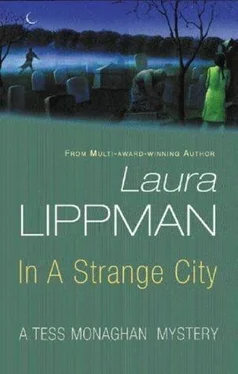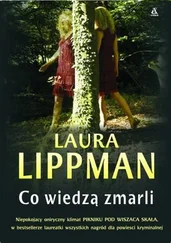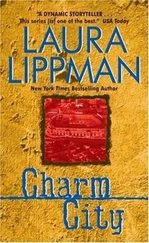The Hilliards’ farm was not easy to find, even with Vonnie Hilliard’s careful directions, which included precise mile markers and such landmarks as an old metal Koontz Dairy sign, which leaned against the barn that signaled the beginning of their property. Mrs. Hilliard had clearly been puzzled by Tess’s request to see them, but it did not occur to her to refuse. She was used to doing what people in authority asked. She did not realize Tess had no authority.
But the Hilliards knew enough not to confuse the visit with a social call. They sat at their kitchen table, hands folded in front of them, making no offer of drinks or food. They had the glum, hopeless look of people in hospital waiting rooms.
“The police have asked us all these questions,” Mr. Hilliard said tonelessly, at one point. “Why would anyone want to kill Bobby? Who were his friends? Did he seem to have more money than he used to have? But we don’t know. We didn’t know anything about his life down there.”
His grim expression suggested he would have preferred to keep it that way.
“I don’t think he’d hurt anybody,” his mother said. “I can’t believe what they said on the television.”
“You saw that cable show?” Tess tried to imagine the Hilliards watching Jim Yeager. How alien it must be to them, the notion of a man who made his living by yapping.
“We have a satellite dish,” Mr. Hilliard said, stung. “We get all the movie channels and then some.”
“But, no, we didn’t see it,” Mrs. Hilliard put in. “Detective Rainer called after, just in case, and said we shouldn’t worry, he didn’t think it happened the way the television man said. But he did ask us if Bobby had known some people. I don’t remember their names…”
Tess did. “ Arnold Pitts, Jerold Ensor, Shawn Hayes.”
“That sounds right.”
“And did he?”
The Hilliards sighed, almost in unison, two people so in sync after years together that they might as well be one.
“We don’t know,” Mrs. Hilliard said sadly. “We just don’t know.”
Tess decided to test their professed ignorance. “Do you know why he decided to give up his profession, the one he had trained for, to become a waiter?”
“More money,” his father said. “He paid for college himself, so I guess it was his business if he wanted to wait tables instead of working in a library.”
“No other reason?” she prodded.
They looked at her as if there could be no better reason, and Tess, glancing around the plain kitchen, felt ashamed. Of course his parents would have accepted this explanation.
“When was the last time you spoke to him?”
“Christmas Day,” Mrs. Hilliard said, happy for a question she could answer. “He was going to come home, but he had to work the night before and the day after, and it was just too much. He sent us some nice things, though. He was considerate that way.”
“Nice things. What?”
“Well, cologne for his father. And perfume for me. And a vase, that one there.” She indicated a blue-white vase on the kitchen counter. It held three silk roses. Tess wondered if it would hold fresh ones, once spring came. If Bobby Hilliard had lived, he might have instructed his mother, ever so gently, to fill it with nasturtiums or zinnias from her own garden.
“Could I see his room?”
“Why?” This was Mr. Hilliard, suspicious.
“I don’t know,” Tess confessed. “But I’ve come all this way, and I’d like to see where he grew up.”
The room where a young Bobby Hilliard had bided his time, plotting his escape from this small town, was an early version of his apartment, filled with yard-sale finds and furniture he had refinished. Only here there were books too, a high shelf filled with boys’ adventure stories: Treasure Island , Danny Dunn and the Homework Machine. No Poe, not that Tess could see, but there was a stack of Classic Comics, with The Gold Bug on top. This might have been a coincidence, as the others in the pile were illustrated versions of Hawthorne, Melville, Crane, and Dickens.
“They’re not that old,” Mrs. Hilliard said.
“Dated 1969,” Tess said of The Gold Bug.
“I mean, they’re not Bobby’s old things. He found them at a yard sale a few years back, when he was visiting. Bought the whole pile for five dollars, and you would have thought he found a diamond ring or something.”
Mrs. Hilliard hugged herself, as if she were cold, and averted her eyes. Tess sensed she didn’t like to see her son’s things touched, so she put the comic book back and continued to examine the room. Bobby had gone through a deco phase before he discovered the Victorian era, judging by the lamps and the framed Maxfield Parrish prints. The bed’s headboard was ornate, the bed itself piled with pillows in fresh white shams, as if the room’s owner were expected back sometime soon.
“It’s lovely,” Tess said, meaning only to be polite, but Mrs. Hilliard’s expression looked wounded.
“Yes,” she agreed reluctantly. Then: “Do you think he was ashamed of us?”
“What?”
“Bobby. Do you think he went off to Baltimore because he was embarrassed by this house? And by us, because we’re just farmers?”
“No,” Tess said firmly, forgetting she didn’t actually know Bobby Hilliard and had no insight into how he thought. “My guess is he moved away because he… because he wanted to pursue a kind of life he couldn’t have here.”
“Well, he could have gone to Pittsburgh, which is closer. It’s not like they don’t have gay men there too.”
Mrs. Hilliard smiled at the surprised look on Tess’s face. “We never spoke of it,” she said, “but I knew. And his father would have known too, if he wanted to. I’m not saying we understand it, and we were brought up in a church that says it’s a sin, but he was our son. We loved him. I was just waiting for a day when Bobby felt comfortable with who he was, because then I thought he might be comfortable with who we are and where he came from. That’s all.”
“I love your house.” Although Tess was being polite, she also was being truthful. “Old farmhouses are beautiful. So many of them have been ruined by ugly additions. I like the original shape: the peaked roof, the porch along the front. You haven’t painted over all the wood, as some people do, or put down carpeting over the wooden floors. You ought to see what allegedly well-intentioned people did to the place I bought.”
“Mmm,” Mrs. Hilliard said, not willing to be comforted or distracted. “I knew he stole. I didn’t want to say, in front of Webber.”
“From the library, you mean?”
“All his life. Here and there. Little things, things he couldn’t even use. He didn’t do it often, and when he did he was like a drunk falling off the wagon. He’d come in looking so tight and guilty, and then he’d ‘fess up, and I’d march him back to the store or the neighbor or the classmate he had stolen from. He always promised it wouldn’t happen again, and time would go by and I would begin to believe him. And then he’d do it again.”
“Did he tell you why he had to leave the Pratt?”
Mrs. Hilliard looked sad. “I guessed. I knew him. I knew his weaknesses. But I loved him.”
“So you believe he did what the police suspect. The burglaries, I mean.”
She sat in a Morris chair. “Uh-uh. Those men down in Baltimore, they say they lost television sets and stereos but nothing else. Bobby wouldn’t do that, see?
That’s what I told the police too-Detective Rainer and those two detectives who came up here, looking for things Bobby was said to have stolen. I let them go all over the place, and they saw for themselves there was nothing here. They wouldn’t listen.“
Читать дальше












